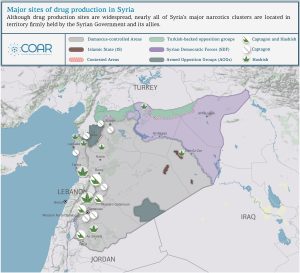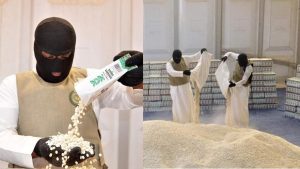What you need to know:
Captagon, an amphetamine popular among terror groups and civilians in the Middle East, is funding terror group operations and increasing the lethality of these organizations. The market for these pills is massive and could escalate violence in the region as rival organizations compete for customers.
What is Captagon?
Captagon is an amphetamine created in the 1960s by a German pharmaceutical company named Degussa Pharma Gruppe. It was used as a central nervous system stimulant to treat conditions like attention deficit disorder (ADD) and narcolepsy. In 1986, most countries discontinued the production of Captagon after it was added to the list of the United Nations Convention on Psychotropic Substances. Unused stocks were smuggled from Europe by Balkan and Turkish organized crime groups into the Middle East. Pressure from Balkan and Turkish security forces significantly reduced the drug’s influx into the Middle East. As demand skyrocketed, local counterfeit production operations in the Levant region of the Middle East were created by local militia and terror groups to profit from that demand according to Al Jazeera.
The drug, as currently created, induces euphoria, reduces the need for sleep, suppresses appetite, boosts energy, and makes the user feel “fearless,” according to the New York Post. It is highly addictive.

Who Creates It Now?
Production of the drug in Syria surged after the beginning of the Syrian civil war in 2011. The economic crisis following the start of the civil war, Syria’s location in the Middle East, and porous borders created perfect conditions for a burgeoning drug market. As the Syrian government regained control of territory from ISIS, production of the drug shifted from local independent operations to organized and controlled production sites. Currently, there is an alleged alliance between the Syrian government and the terror group known as Hezbollah, generating billions of dollars for both entities, according to the New Lines Institute.

Who Uses It?
The first well-documented terror group to use the drug was the Islamic State of Iraq and Syria (ISIS). Many ISIS fighters operated under the influence of Captagon, according to the United States Department of Defense. The drug went by various names, such as the ISIS drug, the jihad pill, and the jihadist’s drug according to Haaretz. Various groups fighting against ISIS likely began using the drug as they seized stocks from ISIS strongholds. The most prominent of these groups is Hezbollah, the Iranian-backed terror group based in Lebanon. The drug is used among Hezbollah and its associates, especially Hamas. Hamas, the Gaza-based terror organization, utilized Captagon during its terror attack on October 7th, according to a statement by Congressman Moskowitz.
Apart from terror groups, the drug is extremely popular among high-class youth in the Gulf States. It is the go-to party drug due to its cost and effects.

What Threat Does It Present?
Captagon is a cheap drug that is easy to produce and has given terror groups the ability to fund their operations long-term. As long as there is demand in the Gulf States for this drug and continued administrative support by the Syrian Government and its allies, terrorism in the Levant and the Middle East as a whole will likely remain consistent.
How Effective are Counternarcotics Operations?
The impact of narcotics trafficking and associated impacts in countries like Jordan and Saudi Arabia has prompted these countries to increase their counternarcotics efforts. Saudi Arabia’s reportedly seized, 46 million pills, 5 million, 15 million, and 6 million pills in separate busts according to the New Lines Institute. Jordan also seized 10 million pills, 6 million pills, in separate busts as well as numerous smaller busts. Over one billion pills of Captagon were seized in Arab countries between 2019-2022 according to the Atlantic Council. Many Arab nations have also engaged in kinetic operations, launching attacks against production sites and smugglers in their own nations as well as in Syria. However, the demand seems to be increasing, according to the Department of State.

The Future of Captagon:
Captagon is likely to become a foundational tool for terror groups, akin to the AK-47. Its usage and production are likely to spread to nations around the world as it becomes known as a quick and easy way to gain funding. Counter-narcotics efforts seem to have failed to lower demand. Similar to cocaine, the vast amount of product moving from producers to buyers is too large to stop through mitigation efforts. As tensions reignite in the Middle East, the drug is likely to become more common as different armed groups engage in combat.
As the demand for the drug grows, competition between rival factions in the Syrian government or Hezbollah could cause a systemic breakdown and lead to multiple armed and funded groups fighting for territory. If this were to happen, it would create unseen levels of strife in the region.


